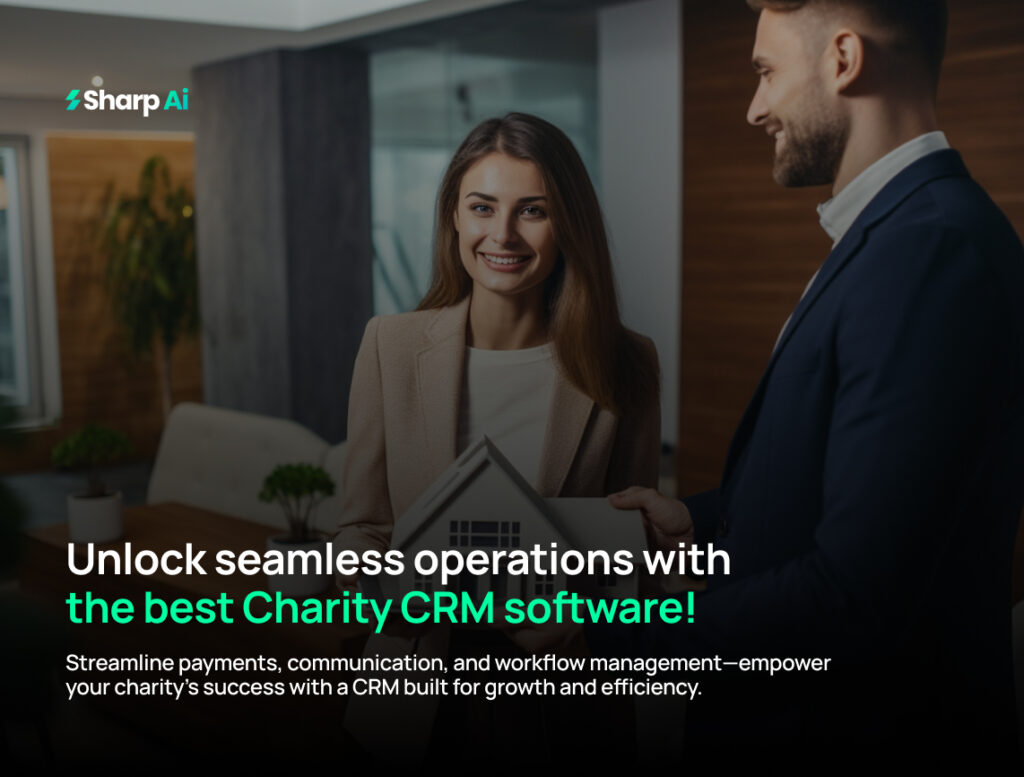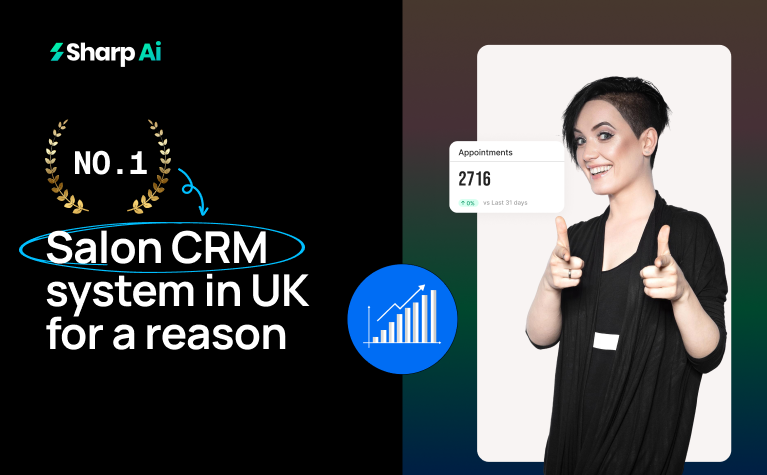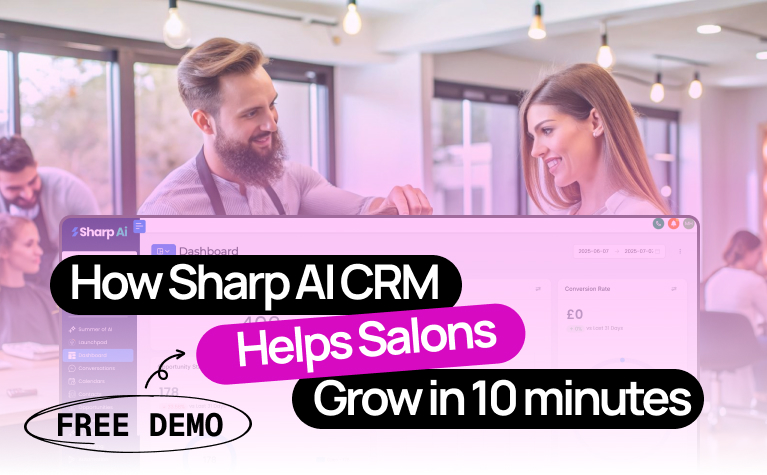In charity business, things have the potential to spiral out of control quickly. But what if you had a system to simplify everything, streamline it, and make it organised? That’s what a charity CRM software does! Not only does a CRM save contact information, it gives you behind-the-scenes superhero magic working for you, engaging donors, monitoring donations, and running your mission like a pro. Sharp AI knows your business doesn’t need investment, it needs structure to kick out the chaos.
By the end of this blog, you will be able to answer which features help the best charity crm software become the benchmark of excellence. Scroll down to read all the insights you need gathered by Sharp AI!
6 Charity CRM Software Features That Are Non Negotiable
The debate on what makes “nonprofit donor management software” is long and tiring with many different opinions and personal experiences complicating the situation. Let’s put the chaotic discourse into order and without further ado, list the 6 critical charity CRM software features you don’t want to compromise:
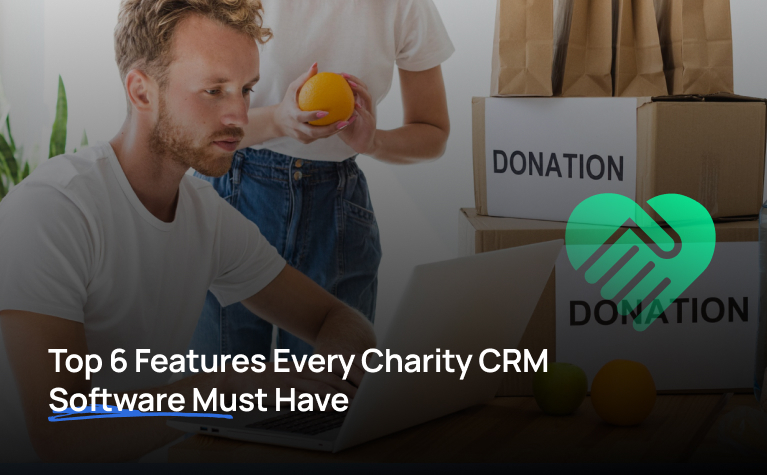
1. Seamless Billing and Payment Integration
First and foremost, a charity CRM software must have a proper billing and payment processor. Seamless Billing and Payment Integration” is a game-changer for charities. It eliminates the drudgery of manual data entry through automated tracking of gifts, taking payments, and claiming Gift Aid, and frees staff time for mission-critical functions.
Streamlined procedures in a charity CRM software UK maximises donor experience, boosts retention, and reduces financial administration complexity which are crucial for charities’ capacity to build rather than fall victim to administrative suffocation.
For UK charities, Gift Aid is a critical element of fundraising. A seamless payment process integrated into the CRM means Gift Aid claims are automatically submitted whenever a qualifying donation is made, saving valuable time and ensuring the charity doesn’t miss out on this valuable additional source of income.
2. Customized Communication Tools
In the world of charity CRM solutions, customized communication tools are a vital feature that tremendously boost the efficiency and efficacy of donor contact, volunteer management, and general fundraising program. Such a consideration turns generic communication into differentiated, high-end interactions that not only enhance donor retainage but also maximize lifetime contribution and participation.
Technically, bespoke communication instruments in a charity CRM enable organisations to use dynamic segmentation, behavioural triggers, and automation workflows to develop very personalised messages through a range of different touchpoints. Based on a review of donor interactions, past gifts, and engagement activity, a CRM can initiate bespoke email tracks or SMS reminders such that the message is tailored to each supporter’s own preference and activity. In data-driven terms, engagement is enhanced through delivering the correct message to the correct individual at the correct time such that donor tiredness is minimised and the likelihood of future support maximised.
Additionally, customized communication in charity CRM solutions can reach out to event attendees and volunteers. Rather than generic reminders, the system can personalize communication to certain volunteer events, volunteer tasks, and even contribution rates. Using advanced profiles and automated tagging, CRMs can release reminder notifications, event updates, or customized thank-you notes in a way that seems appreciative and personal, generating more robust connections with your donors.
Deeper yet, such communication channels are rooted in advanced analytics so as not only to track engagement rates but also to predict future donor behavior. Those machine learning algorithms in the CRM system can analyze data in the past to predict what type of campaign or content a donor is most likely to engage with, uncovering helpful data for optimizing future methodologies. It is possible to learn segments of donors to whom specific types of messaging are most responsive and then change strategy in real time based on behavioral feedback.
Technically, they facilitate smooth integrations with third-party applications such as email marketing systems (Mailchimp, Constant Contact), social media administration tools, and SMS gateways in a bid to expand the reach of customized communication well beyond the CRM. This facilitates charities in constructing multi-channel engagement campaigns delivering unified, consistent messaging via email, text, and social channels to effect holistic engagement with each of their supporters.
3. Seamless Scaling as Your Nonprofit Grows
In the fluid world today, where the requirements of charities change in real-time alongside their growing donor bases, scalability in the best charity CRM software is not optional. The complexity of donor management, compliance regulations, and engagement methods requires a system continuously adaptable without disruptive replacements. A best CRM for charities UK must accommodate smooth upgrades that do not alter data integrity or continuance of operation.
As your nonprofit shifts from a small-scale volunteer-driven operation to a larger, complex organisation, the CRM system must accommodate the addition of new modules, broaden user access, and expand data storage capacity without friction. Such functionality is critical to avert resource bottlenecks, so nonprofit CRM software works seamlessly to accept more users, more funds, and greater donor relations at scale. Top-of-the-line CRM software works so that all upgrades, in user functionality or in reporting functionality, occur in the background, maintaining functional efficiency with no user disruption.
In essence, the ability to scale without hindrance, be it in terms of users, functionalities, or integrations, is an indispensable feature of CRM solutions for nonprofits, positioning it as a key driver of sustained growth for modern charities.

4. Deal Pipeline Handling
Charity CRMs must provide advanced deal pipeline capabilities to track, prioritize, and automate engagement with volunteers and donors throughout their lifetime. Charity CRMs that offer automated donor journeys from initial contact until the fulfillment of a donation significantly enhance business agility and no donor’s interaction goes unmonitored.
As charity business grows increasingly sophisticated, it is even more important for charity CRM solution UK to incorporate a streamlined deal pipeline that not only follows the donor’s progress but also benefits from predictive analytics in forecasting future donations, estimating donor involvement, and automating personalized follow-ups. Such a feature enables charity managers and raisers to track donor movement easily, categorize donors according to growth opportunity, and prioritize pipelines dynamically on real-time data.
Additionally, having a pipeline to manage and monitor fundraising campaigns provides the top nonprofit CRM solutions a means to make real-time strategy refinements. Via integration with nonprofit donor management applications, charities are able to relate their interactions with donors to real-world actions, in short, only data-driven decisions are made. As data saturates the marketplace, it’s no longer a desirable aspect for a charity’s scalable CRM system, it’s a necessity.
5. Quick, Responsive User Experience
With the finest nonprofit CRM software, responsiveness and speed are more than performance criteria, they are essential operational foundations. Charities are working often with limited staff and tight schedules, and they require real-time accessibility to donor records, event schedules, and communication trails. A fast-loading, very responsive, low-lag system CRM assures charity experts are working on high-priority tasks rather than being hindered by slow-moving user interfaces or lagging data acquisition.
In very operationally efficient spaces, where each second matters in interacting with donors, volunteers, and stakeholders, nonprofit CRM solutions must be streamlined to offer a seamless user experience. Top-of-the-line charity CRM software minimizes the operational strain by having even the most comprehensive requests, regarding donation histories, contact details, or campaign updates, answered in milliseconds.
For charity staff working under rigid deadlines to meet campaign timetables or fundraising targets, on-the-spot availability of data, reporting, or communication is not an option. Such smooth, lightning-quick functionality is not only critical to streamlined operation, but also to enhance engagement and ultimately to generate maximized donations.
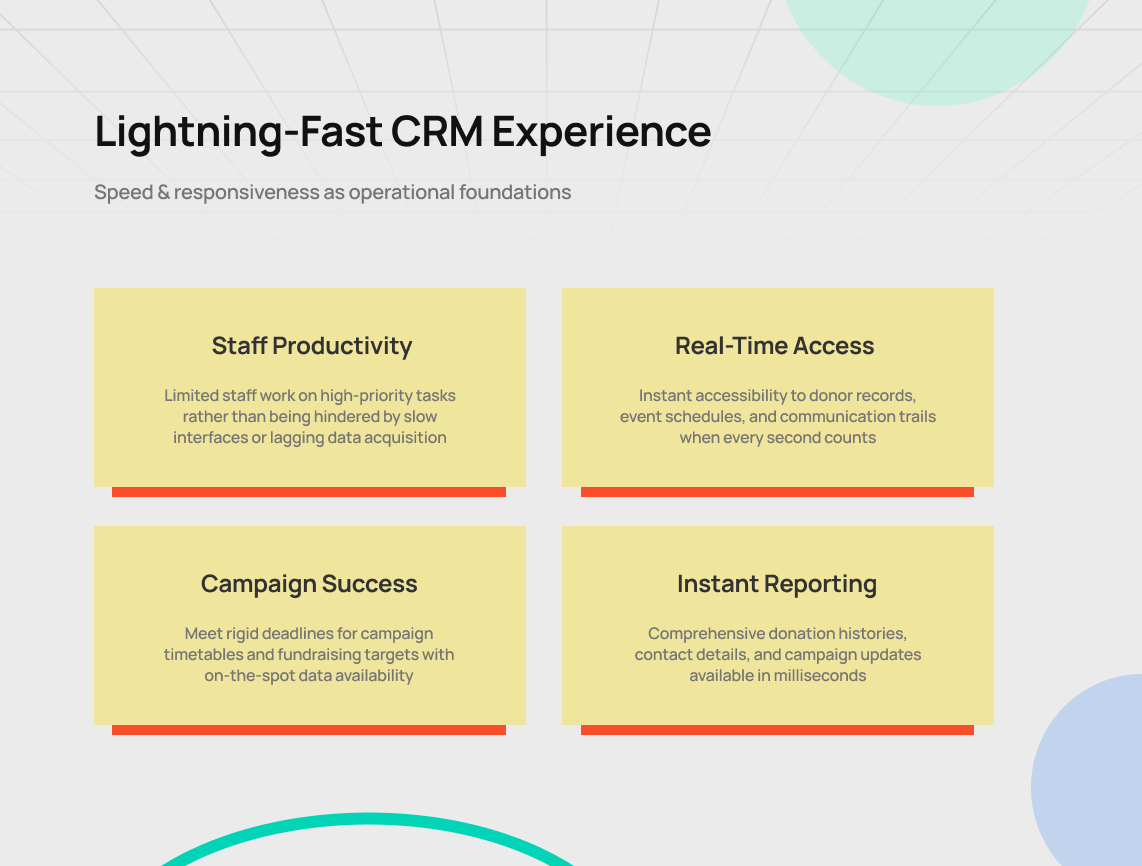
6. Granular Administrator Controls
In the context of charity CRM software, granular admin controls are an absolute necessity to ensure both data security and regulatory compliance. With the constantly evolving landscape of data privacy laws like GDPR, charities must have the ability to enforce role-based access to sensitive donor data, segregate duties across departments, and ensure that only the necessary personnel have access to specific information.
The best CRM for charities UK offers a level of administrative control where permissions are finely tuned, ensuring that financial data, donor identities, and fundraising strategies are only accessible to those with appropriate authorisation. By allowing admins to set specific access levels for volunteers, staff, and board members, charities mitigate the risk of data breaches, unauthorised access, or non-compliance with regulatory requirements.
Also, for larger or federated charities with different locations or teams, granular controls are an absolute necessity for facilitating smooth cross-team working without affecting data integrity. Having the authority to monitor and control who does what on the CRM from data entry to generation of reports makes it possible for the charity to clear both in-house and third-party compliance audits with no risk.
Conclusion: Which Features Are Necessary in Charity CRM Software?
An adequately functioning Sharp AI Charity CRM software isn’t limited to a few features, the discourse goes far beyond. However, streamlined billing and payment, communication tools, upgrading as you go, pipeline management, fast loading, and granular admin control are some of the non-negotiable features that CRM must provide. Tailored communication instruments in charity CRM solutions set the bar for donor communication higher through data-driven insights, automation, and customization. Those communication tools not only automate but actually go on to enhance donor relations, repeat donorship, and finally help charities retain a stronger, lasting relationship with their audience. At such a granular level of customization, charity organizations are in a place to achieve their highest impact, foster loyalty, maximize retention, and realize the cause’s financial sustainability.
Growing and monitoring your charity organisation’s workflow is only possible by incorporating the best nonprofit CRM software so that every operation is performed smoothly.
Key Takeaways:
In this blog, you find that a Charity CRM Software must include:
- Billing and Payment Processor
- Communication Tools for Personalized Outreach
- Easy Upgrade as You Scale
- Deal Pipeline
- Load Fast
- More Granular Admin Controls

